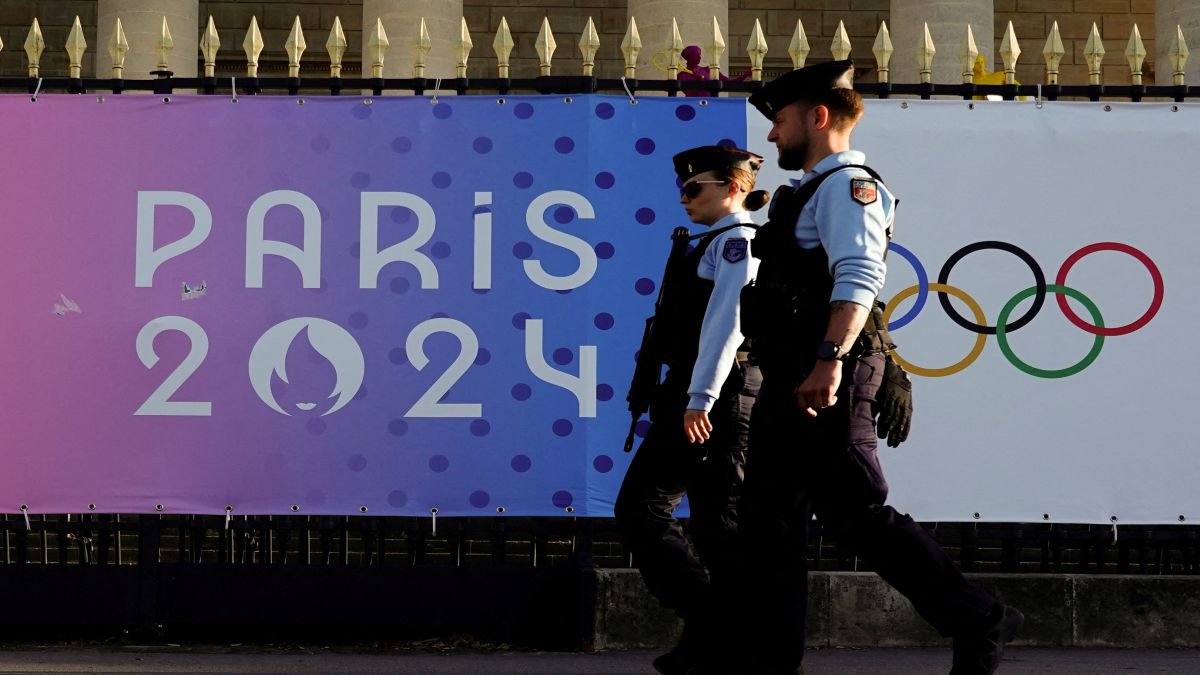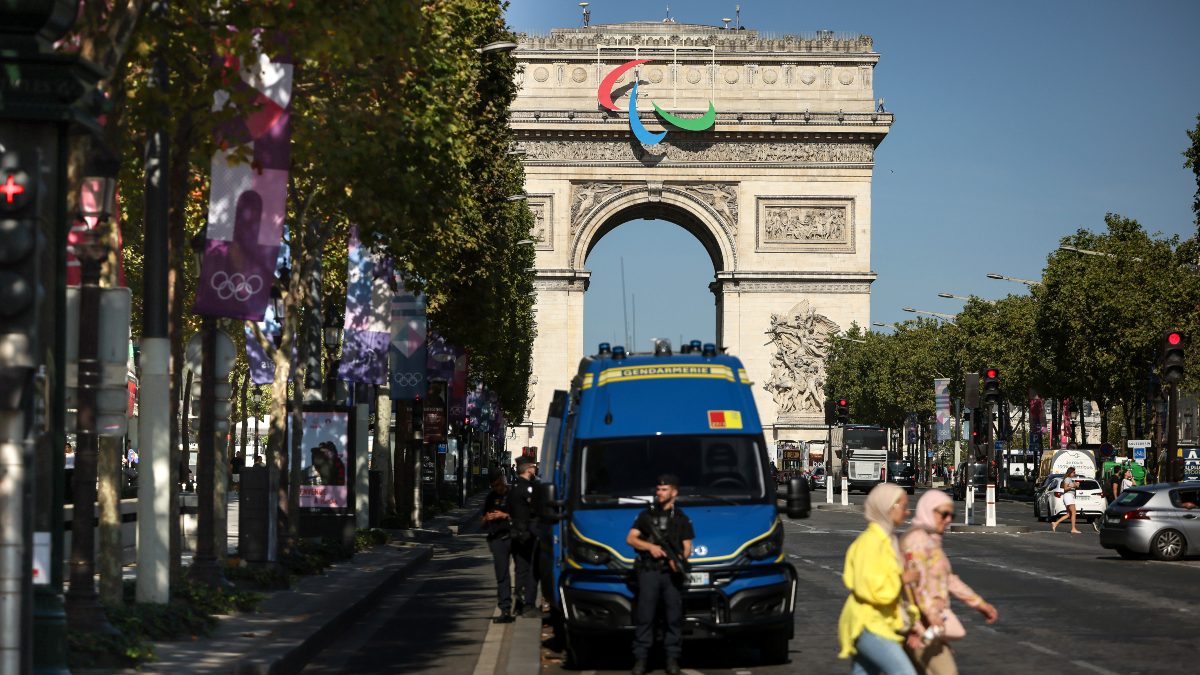The 2024 Olympics is estimated to cost Paris a whopping $9.7 billion, reported to be lesser than the costs of previous host cities. However, the advantages of hosting such a sporting extravaganza are far from clear. Some say the Games are not as economically beneficial. Here’s why read more
)
French gendarmes patrol a street near a poster advertising the Paris 2024 Summer Games in Paris, France. The cost of Paris hosting the Olympics and the Paralympics for facilities and operations is pegged at €8.9 billion, or about $9.7 billion. Reuters
The once-in-a four-year event is finally here. The Paris Olympics 2024 is scheduled to begin today (July 26) and will run until August 11. The sporting extravaganza will see over 10,000 athletes and millions of more spectators converge in Paris for the next 17 days.
But amid all this excitement and buzz over the Games, there’s one important aspect that needs to be looked at carefully: How much does it take for a city to host the Olympics and is it really worth it?
What’s the cost of the Paris Olympics?
As of date, the cost of Paris hosting the Olympics and the Paralympics for facilities and operations is pegged at €8.9 billion, or about $9.7 billion. As S&P Global Ratings report has said that the spending for the Games in Paris is expected to come in at under $10 billion — only about 25 per cent over the initial budget.
Securing the Olympics — this event faces risks like no other sporting event in recent history — is expected to push the price tag even higher. France has announced that it is deploying 45,000 police and soldiers and 50,000 private contractors to secure the Games in the Paris region. And to avoid strikes by public workers, France agreed to offer bonuses and other incentives.
There’s also the added cost of cleaning the River Seine — a whopping €1.4 billion ($1.5 billion) has been spent for athletes to swim in it. There’s also about €3.5 billion ($3.8 billion) to extend Metro line 14.
Despite these mounting costs, the Organising Committee for the Olympic Games (COJO) insists that the Games are quite ‘cheap’.
How does it compare to past Games?
The Paris Olympics as of now is less expensive than the London Games of 2012 ($16.8 billion), Rio in 2016 ($23.6 billion) and Tokyo in 2021 (over $13.7 billion), according to a study co-authored by Budzier.
As per the S&P Global Ratings report, the Games in Rio de Janeiro and in Tokyo deviated from their original budgets by more than 350 per cent and 280 per cent, respectively.
There’s a larger trend here. A 2020 paper by Oxford economist Bent Flyvbjerg found that “every Olympics since 1960 has run over budget, at an average of 172 percent in real terms, the highest overrun on record for any type of megaproject.”
But what has led to this drop in costs? This is because of the existing infrastructure. About 95 per cent of the venues slated for use during the Paris Olympics existed before the city’s winning bid to host the Games. Only three were built afterward: the $1.6 billion Olympic Village, the $190 million Aquatics Centre and a $150 million gymnastics and badminton venue.
If it’s so expensive, why do cities host the Games?
The International Olympic Committee (IOC) has declared, “Hosting the Olympic Games generates powerful economic benefits.” It has been cited that hosting the Games creates more jobs, boosts tourism and improves the city’s financial health. A report by The University of Limoges said that the 2024 Olympics is expected to provide Paris with a net economic benefit of nearly $12.2 billion.
Most times the IOC cites the 1992 Barcelona Games as a perfect example of how the event leaves a positive impact on the city. Following the Games that year, Barcelona rose from the eleventh to the sixth most popular destination in Europe.
Additionally, the Games is an opportunity for the host city to attain global prestige. It’s about politics and geopolitics. Paris bid for the Games after the 2015 deadly terrorist attacks to show the strength of the French Republic and its culture after a troubling time — the 2008 financial crisis, terror attacks and the fragility of Europe post-Brexit. It was also thought the Olympics could show the strength of France’s multicultural society.
Also read: Paris Olympics 2024: A guide to survive in the ‘City of Snobs’
Is it really worth it though?
While the people involved in the organising and hosting of the Games would claim that the event is economically beneficial to the city, economists argue otherwise. As the Council on Foreign Relations (CFR) reported that research reveals that “these purported benefits are dubious”.
The CFR cited a study of the 2002 Olympics in Salt Lake City which found that the games had created “seven thousand additional jobs — about one-tenth the number promised by officials — and no long-term increase in employment”. These jobs, many in construction, often go to people who are already employed. Another study cited by the CFR found that only 10 per cent of the 48,0000 temporary jobs during the 2012 London Games went to people who were previously unemployed.
The Paris 2024 organising committee claims that the event will be “a lever for boosting activity and employment”, thanks to “over 181,000 jobs mobilised”. It specified that this figure includes jobs specifically created for the occasion, and jobs that will be involved in the Olympics in some way, but already exist.
What this means is that there won’t be a trickle-down effect. Moreover, in many cases, the hotels, car rental agencies, airlines and similar firms are either nationally or internationally owned which means the profits don’t stick to the host city.
Even in tourism, the results are a mixed bag. While Barcelona received a tourist boost, Beijing, London, and Salt Lake City all saw decreases in tourism during the years that they hosted the Games.
Martin Müller, professor of geography and sustainability at the University of Lausanne, told Euronews Business speaking on the Paris Games said, “Olympic tourists will largely replace other tourists that would have come anyway.” He estimated that the economic effect the Olympics will have on the French capital will likely be negligible.
There’s also the issue of Olympic sporting facilities, which were built with exorbitant price tags, falling into a state of disrepair after the Games. For example, the ‘Bird’s Nest’ stadium in Beijing, which cost China $460 million has been left largely untouched since the 2008 Games, costing the Asian nation nearly 10 million dollars a year for maintenance, as revealed by The Atlantic.
Another horrifying example emerges from Rio. Just six months after the 2016 event, the Maracana Stadium was looted. Also, visuals revealed worms had caused damage to the stadium.
Besides the poor return on investment, the Games are a pain to the locals. For many in Paris, the next two weeks could be a nightmare owing to the influx of tourists. It is also going to make life more expensive in the City of Love. Paris’s public transport authority has raised the price of Métro tickets by more than 85 per cent and doubling the cost of bus tickets during the Olympic and Paralympic Games. A single journey ticket in the Métro will rise from €2.15 to €4, while a ticket for a city bus will double from €2.50 to €5 from July 20 – six days before the Games begin – and remain until September 8, the transport authority RATP has announced.
It is for these reasons, perhaps, that cities are steering clear of bidding to host the Games. For instance, for these Games, numerous potential cities including Boston, Budapest, Hamburg, and Rome, withdrew their applications leaving only Paris and Los Angeles in the final pool.
Fearing the same for the 2028 Games, the IOC did the unthinkable, awarding the 2028 Summer Games to Los Angeles without even making a call for other bidders.
Here’s something to think about, but in the meantime, tune into the Paris Games and cheer on the Indian contingent!
With inputs from agencies

 1 month ago
51
1 month ago
51
)
)
)
)
)
)
)
)
)
)
)
)
)
)
)
)
)
)
)
)
)
)
)
)
)
 English (US) ·
English (US) ·